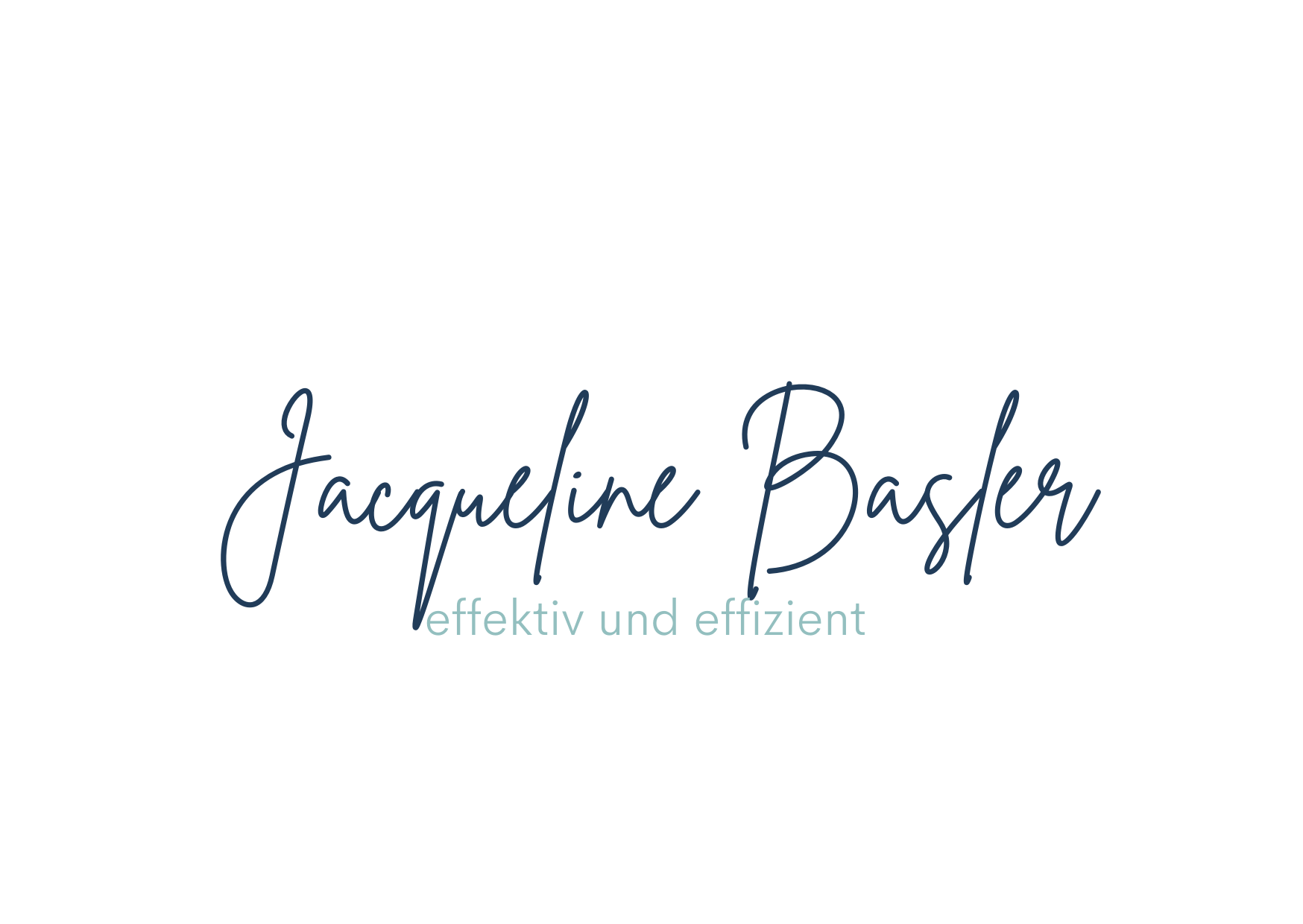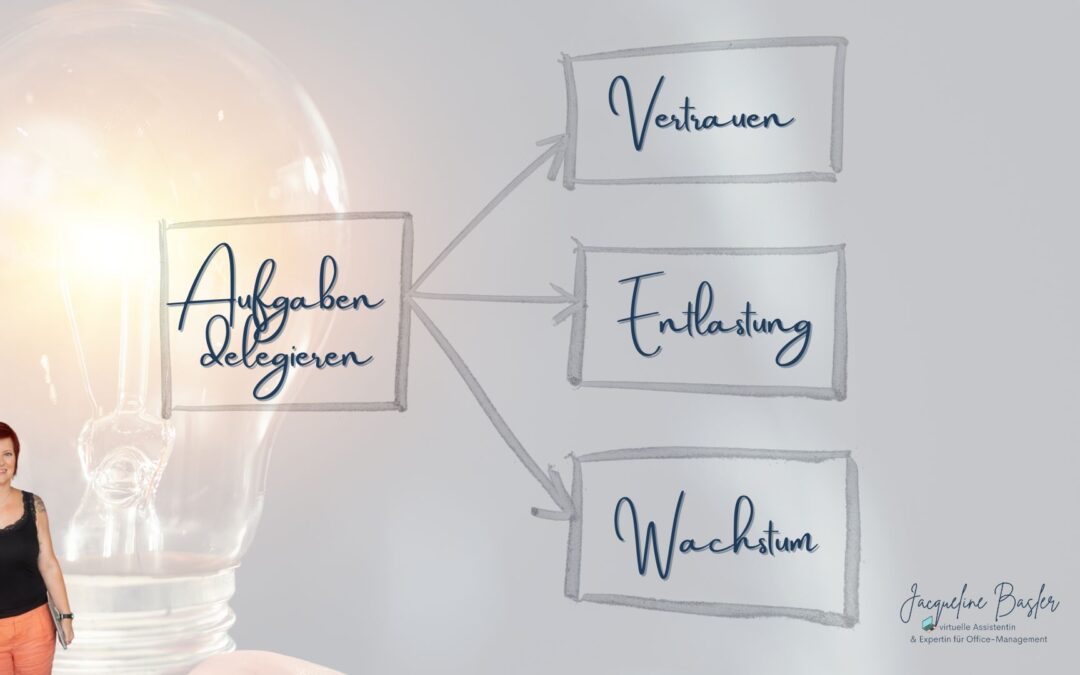Can you repair a burst water pipe? Or sew a pair of trousers? If you can do both – congratulations. I can’t, so I pass these tasks on to someone who can do it better than me. And that’s exactly what delegation is: You hand over a task. But while this may seem natural for manual or technical work, many self-employed people find it difficult to hand over tasks in their own business. After all, these are ‘their’ projects, their ideas, their lifeblood. Delegating can not only clear your head, but is also the key to sustainable success. In this article, you will find out why the self-employed in particular benefit from a strong team and how to take the first step towards delegation – without giving up control. Delegating tasks correctly: the key to success.
No person will make a great business who wants to do it all himself or get all the credit.
Andrew Carnegie (Wirtschaftstycoon 1835-1919)
Why self-employed people find it difficult to delegate tasks!
For many self-employed people, delegating is a hurdle – not because they don’t see the benefits, but because old beliefs and mistrust often stand in the way. In the corporate world, delegating tasks is a matter of course: everyone has their role and tasks are distributed appropriately in order to work together more efficiently. In your own business, however, this is often difficult. Why is that?
A common reason is the feeling that only you really understand the tasks and can implement them accordingly. In addition, external employees are often perceived as ‘strangers’, which increases the inhibition threshold for entrusting them with confidential information. There is a lack of trust and the mindset of handing over tasks feels ‘wrong’. There is always the worry that nobody understands your company as well as you do.
Many self-employed people also believe that delegating is more time-consuming than doing it themselves. Sharing knowledge and giving instructions often seems tedious – overlooking the fact that this initial investment can often pay off later.
And, of course, perfectionism also plays a role. Those who have built up their business alone want every little thing to be done ‘perfectly’ and often have high standards. As a result, they prefer to take on tasks themselves instead of risking that they could be done differently.
Delegating therefore requires a change in your own mindset: It means letting go, trusting and planning for the long term – a step that ultimately not only takes the pressure off, but also takes the business to a new level.
Why the self-employed absolutely need long-term support!
Self-employed people often tend to only hand over tasks for short-term projects instead of focussing on long-term support. However, continuous collaboration is the key to sustainable growth and taking the pressure off day-to-day work. Long-term support brings numerous advantages:
- Trust and reliability: a permanent team member or a reliable external partner develops a deep understanding of the company, its working methods and specific requirements over time. This creates a high level of trust and the certainty that tasks will be completed competently even in their absence.
- Efficiency and time savings: Constantly training new freelancers for individual projects costs a lot of time and energy. Long-term support, on the other hand, enables routine workflows and reduces familiarisation time, as tasks and processes are known.
- Proactive support: Long-term partners often think along with you and suggest improvements themselves. They recognise bottlenecks before they occur and offer solutions that further optimise the workflow.
- Focus on the core tasks: Those who continuously hand over tasks create space for the essentials: strategy, growth and creative ideas. This allows the self-employed to focus more on the vision and development of the company.
Bringing a team member on board for the long term does not mean relinquishing control – it means sharing responsibility in a targeted and trusting manner. The security that comes from long-term support makes the difference between a daily routine full of to-dos and a structured, successful business with clear priorities.
Getting started: Start with small projects or introduction sessions
Starting to delegate does not necessarily mean handing over all tasks. It often makes sense to start small and approach collaboration step by step. This makes it easier to build trust and gives self-employed people the opportunity to familiarise themselves with the work steps and processes of the external partner.
A good way to get started is to begin with small projects – for example, a task that arises regularly but does not have a critical impact on day-to-day business. This allows you to see for yourself how the collaboration works and whether your partner’s working style suits you.
Introduction sessions are also ideal to make it easier to get started. For example, I offer a package of 3 or 5 hours in which we can work on small tasks or test initial processes. This gives you a good impression of how delegating really frees up your time and space.
Through these familiarisation lessons or manageable projects, you can get used to delegating step by step without feeling like you are immediately giving up control. The first successful experiences often show how much relief even small tasks can bring – and that delegating is a valuable tool for being able to focus on the big picture in business again.
Security and control when working together
A common obstacle to delegation is concern about security and control. Especially when working with external partners, who often have no fixed place in the company, it is important to create clear structures in order to build trust and protect sensitive information. Here are some tried and tested measures that ensure security and transparency:
- NDA (non-disclosure agreement): A non-disclosure agreement forms the basis for the secure exchange of confidential information. This contractually stipulates that all shared content remains protected.
- Password manager: Tools such as LastPass or 1Password enable the secure sharing of access data without passwords having to be exchanged directly. This means that the company retains control over all logins, while access can be specifically authorised or revoked.
- Cloud solutions on your own server: Data can be securely stored and shared in cloud systems, ideally on a dedicated server. This makes it possible to control who has access to certain documents and access rights can be quickly adjusted if necessary.
- E-mail accounts for employees: A separate e-mail address for the external partner not only creates a clear separation for communication, but also facilitates access to certain programmes and enables a professional appearance to the outside world.
- Transparent communication and clear separation of tasks: Regular updates and clear agreements help to maintain an overview and ensure that everyone is on the same page.
These measures provide security and give you control over your data and processes while ensuring a smooth and efficient workflow. This turns delegation into a strategic advantage without compromising the security of your company.
It doesn’t make sense to hire smart people and then tell them what to do; we hire smart people so they can tell us what to do.
Steve Jobs (ehemaliger CEO Apple Inc 1955-2011)
Tasks develop over the course of the collaboration
Over time, collaboration between the self-employed and their external partners often develops from simple tasks to more complex projects. Initially, smaller, time-consuming tasks are usually delegated – such as replying to emails, managing the calendar or maintaining social media accounts. However, once trust has been built up, many self-employed people recognise the advantage of sharing greater responsibility and receiving strategic support.
- Long-term partners get to know the company’s needs better and can increasingly work independently. Here are some typical stages of development:
From routine to project management: At first, standard tasks are often delegated, later the partner also takes on independent project management tasks. This includes the planning and implementation of campaigns or the coordination of events. - Strategic support: Over time, external partners become valuable consultants who optimise processes, introduce tools and automation or contribute new ideas to make the company more efficient.
- Proactive action: A trusted partner can also proactively point out bottlenecks or opportunities and make suggestions that move the business forward. From the introduction of new tools to the organisation of the back office, they increasingly act as a strategic support.
- Flexibility for larger projects: Even for special challenges such as product launches or important meetings, an experienced partner can provide quick and efficient support without a long familiarisation period.
This development shows how valuable long-term support is: external partners not only take on tasks, but also grow with the company and actively contribute to its success. Delegating thus becomes a key strategy for continuously developing your own business.
Conclusion
Self-employment does not mean ‘by yourself’ and ‘all the time’. In fact, one key to success is not to do everything on your own, but to seek targeted support. Consider whether a virtual assistant could be the right step for you: She gives you the space to work on your business instead of being trapped in routine tasks over and over again.
To delegate effectively, it’s important to think carefully about which tasks you can hand over without losing control. You keep the reins in your hands and determine the direction of your company while you continue to grow through optimised processes and relief. Take some time and regularly note which tasks someone else could do just as well or even better for you. Examples of this are
- Maintaining and managing your website or blog
- Creating and editing graphics, images and layouts
- Proofreading texts
- Preparing seminar documents
- Planning events
- Taking care of the preparatory bookkeeping
I recommend that everyone starts to think about delegating at a certain point. It is certainly not an easy decision, after all, you are giving away a lot of information and making yourself dependent to a certain extent. But the added value for your company can be enormous. Many projects can hardly be realised on your own – and certainly not in a timely manner. With support, you can develop your business further and refocus on what really matters to you.
Ready to take your business to the next level?
Let’s find out together how I can best support you. Book a no-obligation consultation now and we’ll discuss your individual needs and wishes. Discover how delegating gives you the freedom to focus on the essentials again. I look forward to getting to know you!
About the author
I am Jacqueline, a self-employed virtual assistant, family manager and until recently a student on a distance learning Bachelor of International Management program.
During my time as an executive assistant, I realized that I like planning, organizing and structuring and that I have a talent for making other people’s lives “administratively” easier.
My mission as a VA is to give my clients more freedom, ease and time through my support – for a better work-life balance!
I am structured and organized and always have a smile on my face. I can familiarize myself with new software and systems very quickly and not only think about processes, but also like to develop them further (with you).
If you would like to know more about my background and my WORK – LIFE – BALANCE, please have a look at the page That’s me!over






